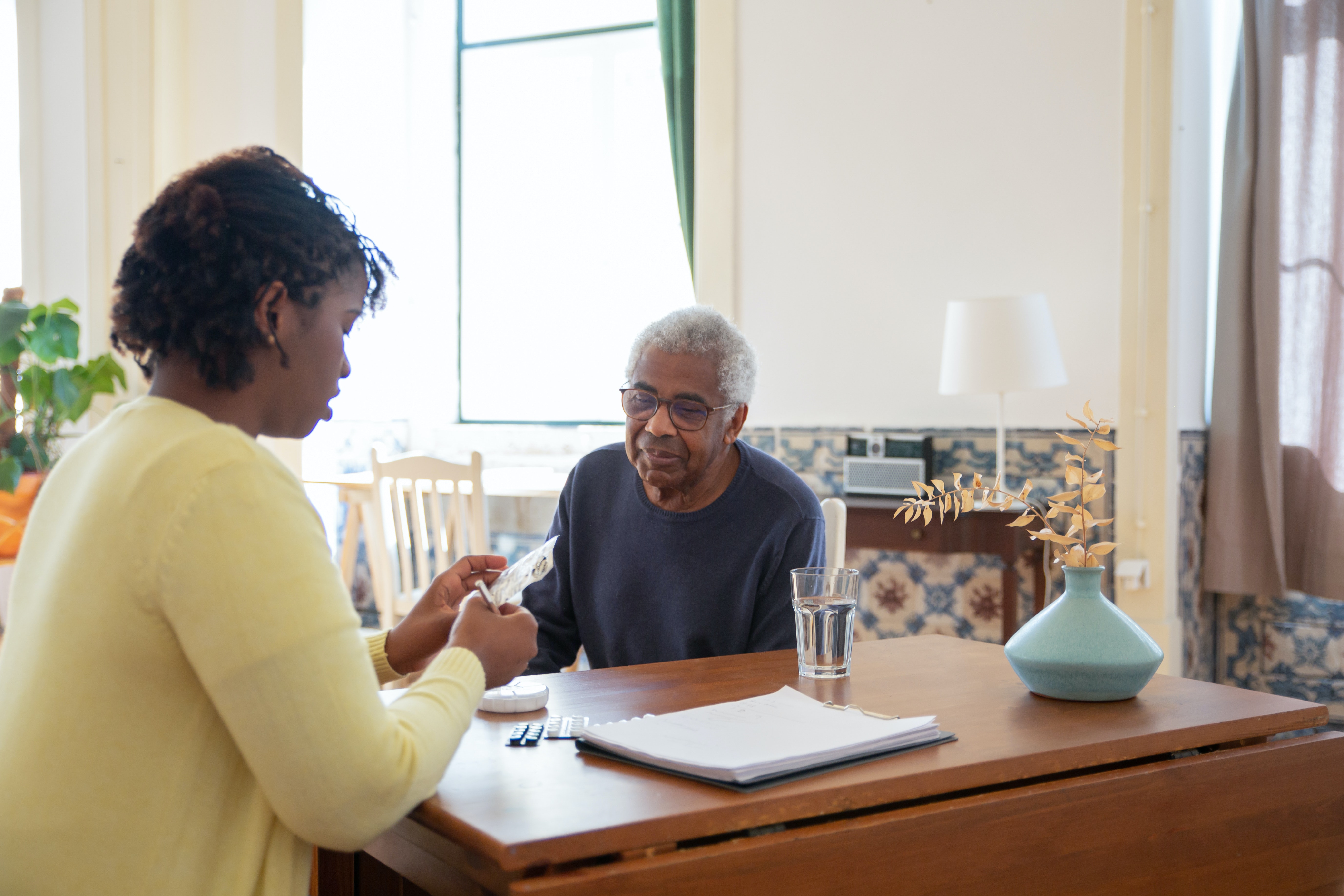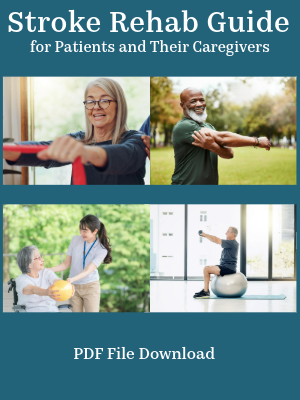Caregiver Assistance

Caregiver assistance is a topic often overlooked when discharging stroke patients home with their family. Essential guidance such as information on medications, adapting the home, and continued rehabilitation is often provided during the discharge process, but information on how to get assistance as a caregiver may be limited, leaving caregivers to navigate uncharted territory on their own. Caregivers sometimes are left feeling abandoned and unsure once they return home with their loved one who has suffered a stroke.
Caring for a loved one who has experienced a stroke can be challenging. As the primary caregiver, family members often assume numerous responsibilities after their loved one's hospital discharge. It is important as a caregiver to know what local resources are available to you. Here is a list of some services you should familiarize yourself with as a caregiver:
Home Healthcare Services: Home healthcare agencies offer a range of professional services, including skilled nursing, physical therapy, occupational therapy, speech therapy, and medical social services. These services can help stroke patients with their recovery and rehabilitation in the comfort of their own home.
Respite Care: Caregiving can be physically and emotionally demanding. Respite care services provide temporary relief for caregivers, allowing them to take breaks, attend to personal needs, or simply recharge. Respite caregivers can be family members, friends, or professional healthcare providers.
Outpatient Rehabilitation: In some cases, stroke patients may be ready for outpatient rehab at a clinic which can often provide more intense rehabilitation than home health therapy. Finding a center with physical, occupational and speech therapists trained in working with neurological impairments is essential. These facilities will have more equipment to help a patient maximize recovery.
Support Groups: Caregiver support groups provide a valuable platform for caregivers to connect with others facing similar challenges. Joining a stroke caregiver support group can offer emotional support, practical advice, and a sense of community.
Home Modifications: Adapting the home environment to accommodate the needs of the stroke patient is essential. Caregivers can seek advice from occupational therapists or home modification experts to make necessary changes, such as installing handrails, ramps, or adaptive equipment.
Meal Delivery Services: Ensuring proper nutrition for the stroke patient is vital. Meal delivery services, whether from local organizations or commercial providers, can help ensure the patient receives well-balanced and nutritious meals.
Medication Management: Keeping track of medications and ensuring they are taken correctly is crucial for stroke patients. Caregivers can use pill organizers or medication reminder apps to help with this task. Make sure you know the side effects of all medications, so you can monitor any ill effects on your loved one and discuss these with the physician.
Transportation Services: Stroke patients often have difficulty with mobility, and caregivers may need assistance with transporting their loved one to medical appointments or therapy sessions. Some communities offer transportation services specifically for seniors and individuals with disabilities.
Case Management Services: Case managers can help caregivers navigate the complexities of healthcare systems, coordinate medical appointments, and connect them with various resources and support services. If your loved one is receiving home health, there should be a case manager available to assist you.
Senior Center and Recreation Services - These centers offer a wide range of activities and services tailored to meet the needs of older adults, including stroke survivors. They provide a welcoming environment where older adults can socialize and connect with peers. For stroke patients who may experience isolation or loneliness, participating in social activities at these centers can have a positive impact on their emotional well-being. Some of the services they may offer are exercises classes, arts and crafts, games, meals, transportation services, educational workshops, community outings, and more.
Medical Alert Systems: These systems can provide an added layer of security for stroke patients who may be at risk of falls or emergencies. Medical alert devices can summon help with the press of a button. There are also devices that can alert caregivers when a patient tries to get up on their own. These may be needed with those that have limited mobility combined with cognitive issues or impulsiveness.
Palliative Care or Hospice Services: In cases where stroke patients have advanced or terminal conditions, palliative care or hospice services can offer comprehensive medical and emotional support to ensure the patient's comfort and dignity.
By familiarizing themselves with these services, caregivers can enhance the care they provide to stroke patients at home and ensure their own well-being as well. It's essential for caregivers to actively seek out available resources and support to ease the caregiving journey and optimize the recovery process for their loved ones.
In addition, consult with family and friends to see if they are willing to help you - this could be with cleaning, cooking, offering to stay at your house while you go shopping, etc. Do not be afraid to ask for help. It's also important to find time for yourself. If you are taking your loved one to outpatient therapy for a couple of hours, leave and use that time to go do shopping, run errands, take a nap, exercise, visit with friends, or just spend some quiet time alone.
|
 |
The following is a list of websites that talk about caregiver assistance and information. Find out how to assist with stroke recovery, what's involved in elder care, how to deal with issues that caregivers face, if you can get paid as a caregiver, and how to hire outside caregivers.
www.Caregiver.com
A leading provider of information and resources for family and professional caregivers.
www.Caregiver.org
Founded in 1977, Family Caregiver Alliance was the first community-based nonprofit organization in the country to address the needs of families and friends providing long-term care at home. Long recognized as a pioneer in health services, FCA now offers programs at national, state and local levels to support and sustain caregivers.
ARCH National Respite Network - Helping caregivers rest and recharge. Information on respite services and also has information about getting paid to be a caregiver.
Eldercare Locator - a public service of the U.S. Administration on Aging with lists of services for older adults and their families.
American Stroke Association Caregiver Page - webpage that provides caregiver assistance information. The ASA, a division of the American Heart Association, provides a range of resources for stroke caregivers, including tips for daily care, information on communication, and coping strategies for caregivers.
Get Our Stroke Rehab Guide

Our comprehensive stroke rehab guide in pdf format is designed for both patients and caregivers who want clear, practical ways to support recovery, improve daily function, and regain independence at home. It includes
- Rehab exercises with pictures for safe home practice
- Physical, occupational, and speech therapy guidance
- Tips for daily activities and adaptive equipment
- Answers to common questions from patient and caregivers
- Information on stroke causes, treatment, and prevention
A single therapy visit can run $150 or more. The Stroke Rehab Guide is only $14.99, and includes a pdf guide you can continue to refer to in the future with exercises and information on stroke recovery. In addition, any time an update or new version of the guide is written, you will get the updated version for free.

About the Author
Karen Murray, OTR, CHT, CSRS, is a licensed occupational therapist, Certified Stroke Rehabilitation Specialist, Certified Hand Therapist, and Certified Personal Trainer with over 29 years of experience working with stroke survivors in hospital, outpatient, and home settings. She founded Stroke-Rehab.com to help patients and caregivers better understand stroke recovery, find evidence-based resources, and regain independence at home.
Medical Disclaimer: All information on this website is for informational purposes only. This website does not provide medical advice or treatment. Always seek the advice of your physician or other healthcare provider before undertaking a new healthcare or exercise regimen. Never disregard professional medical advice or delay seeking medical treatment because of something you have read on this website. See the disclaimer page for full information.











